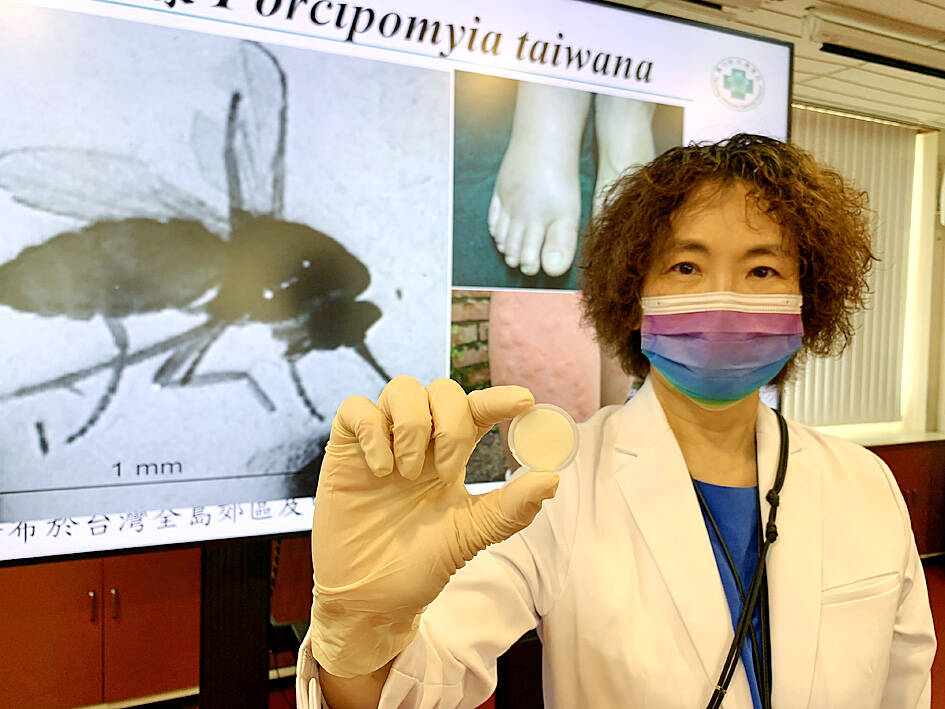Taichung Veterans General Hospital yesterday said it has developed the world’s first vaccine patch to treat bites from the Forcipomyia taiwana, a biting midge also known as the “little black mosquito,” which is responsible for many irritating bites in the summer.
Chen Yi-hsing (陳怡行), a doctor at the hospital’s Department of Allergies, Immunology and Rheumatology, said the human body shows a strong immune reaction to the allergen introduced by the pest.
Common symptoms include blisters, swelling, fever and swollen lymph nodes, she said.

Photo: Tsai Shu-yuan, Taipei Times
Working with hospital researcher Lee Mei-fang (李美芳), Chen used secretions from the salivary glands of the F taiwana to isolate the allergen and, using protein purification techniques, made a DNA-based vaccine patch.
Tests on laboratory mice showed that applying a single patch for one hour per week for three weeks produced protective antibodies in the rodents, while causing a decline in the immunoglobulin E count, Chen said.
Following treatment, there was a definitive decrease in inflammatory cell infiltration among mice bitten by F taiwana, she said.
The test results showed that the patches are effective, she added.
If used on humans, the patches could have lasting effects for as long as 10 years, Chen said, adding that she hoped to start human trials as soon as possible.
There is a considerable number of people in Taiwan who are allergic to F taiwana bites, she said.
At least 10 percent of the people who went for allergy testing at the hospital turned out to be allergic to the bites, she added.
F taiwana are very small and are more likely to bite exposed skin during the day, Chen said.
As the insects usually move in groups, people who notice a bite have usually been bitten several times already, she said.
Most mosquito repellents have little to no effect against F taiwana and only repellents that contain DEET are effective, she added.

The Chinese military has built landing bridge ships designed to expand its amphibious options for a potential assault on Taiwan, but their combat effectiveness is limited due to their high vulnerability, a defense expert said in an analysis published on Monday. Shen Ming-shih (沈明室), a research fellow at the Institute for National Defense and Security Research, said that the deployment of such vessels as part of the Chinese People’s Liberation Army (PLA) Navy’s East Sea Fleet signals a strong focus on Taiwan. However, the ships are highly vulnerable to precision strikes, which means they could be destroyed before they achieve their intended

About 4.2 million tourist arrivals were recorded in the first half of this year, a 10 percent increase from the same period last year, the Tourism Administration said yesterday. The growth continues to be consistent, with the fourth quarter of this year expected to be the peak in Taiwan, the agency said, adding that it plans to promote Taiwan overseas via partnerships and major events. From January to June, 9.14 million international departures were recorded from Taiwan, an 11 percent increase from the same period last year, with 3.3 million headed for Japan, 1.52 million for China and 832,962 to South Korea,

SOVEREIGNTY: The rigs show that Beijing ‘rejects Taiwan’s jurisdiction’ by building in areas where Taipei demands permission to build or alter installations Chinese oil rigs have been sighted just 26 nautical miles (42km), from Taiwan’s exclusive economic zone (EEZ) near Pratas Island (Dongsha Island, 東沙島), posing a threat to Taiwan’s sovereignty if left unchallenged, a brief published by the Jamestown Foundation on Tuesday said. Pratas Island, 444km from Kaohsiung, is northeast of the South China Sea and houses a Taiwanese garrison. The brief, titled “Rigging the Game: PRC Oil Structures Encroach on Taiwan’s Pratas Island” — referring to the People’s Republic of China — analyzed photographs and said that Beijing’s tools to pressure Taiwan now include oil rigs. “Oil rigs now constitute part of Beijing’s

The Taiwan Experience Education Program (TEEP) has funded short-term internships in Taiwan for more than 4,500 young people from more than 40 countries since 2015, with the goal of attracting and retaining international talent, the Ministry of Education said yesterday. Fifty-five colleges launched 514 projects this year, including in fields such as semiconductors, artificial intelligence, medicine and biotechnology, green energy, and sustainability, it said. The program provides research and practical internships in Taiwan for two to six months, and offers cultural exchange and networking opportunities, the ministry said. For example, National Formosa University’s Embedded System and Autopilot Laboratory developed two solar-powered drones in